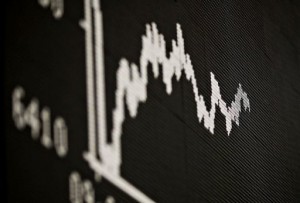
In London, the FTSE 100 index ended the day with a loss of 1.78 percent at 5,554.55 points, after trading resumed following a long holiday weekend.
In Paris the CAC 40 lost 2.78 percent to 3,124.80 points, while Frankfurt’s DAX 30 shed 1.90 percent to 6,444.74 points.
Investors spent the day mulling the chances of a spike in eurozone tension as Greek politicians struggled to establish a workable ruling coalition and the European Union scheduled an exceptional growth meeting for May 23.
Greek stocks gave up another 3.62 percent after falling by 6.67 percent on Monday, and now finds themselves at a level last seen around 20 years ago.
In foreign exchange deals, the euro dropped to $1.3005 from $1.3052 in New York late on Monday.
Stock trading in New York was also weighed down by the eurozone tension, and at 1430 GMT, the Dow Jones Industrial Average was off by 0.92 percent at 12,888.34 points.
The S&P 500 had fallen by 1.03 percent to 1,355.45, while the tech-rich Nasdaq was off by 1.26 percent at 2,920.36.
Pessimism generated by a Greek vote that repudiated austerity agreed to by parties that had negotiated a second rescue package from the European Union and International Monetary Fund (IMF) undermined market sentiment.
Greeks might have to head back to the polls if no coalition government can be formed.
And Capital Economics economist Ben May said: “There is a clear risk that a new election may not lead to a decisive outcome, leading Greece to withdraw from the bail-out deal and default” on its sovereign debt.
Interactive Investor derivatives chief Mike McCudden added: “With the sight of yet more roadblocks on the road to recovery for the eurozone, investors hoping for some positive surprises from the French and Greek elections have been left largely disappointed.
“We are seeing increased pressure on the euro as remaining confidence for the embattled group of nations goes out the window.”
Pressure increased on president-elect Francois Hollande to stand by France’s austerity commitments after ousting ring-wing incumbent Nicolas Sarkozy.
Hollande has said that kickstarting European growth will be at the top of his agenda, putting him on a collision course with some EU leaders — like German Chancellor Angela Merkel — over Hollande’s vow to renegotiate the bloc’s fiscal pact.
Japan joined those raising concerns about Hollande’s plans on Tuesday, with Finance Minister Jun Azumi warning the next French president to pursue fiscal discipline.
“We want (France) to do what has been decided so far,” Dow Jones Newswires quoted Azumi as telling a news conference.
“I think it is impossible (for European countries) to give up on fiscal-rebuilding efforts,” he added.
According to IMF data, Japan’s general government net debt amounted to 126.6 percent of gross domestic product (GDP) last year, while that of France was a much lower 80.4 percent,
Much of Japan’s debt is held domestically however, which puts less pressure on governments.
In Greece, which the IMF data showed had debt equivalent to 160.8 percent of GDP last year, the cost of borrowing jumped on Tuesday as officials tried to raise 1.3 billion euros ($1.7 billion) in a sale of six-month treasury bills.
Athens offered a return of 4.69 percent to investors, up from 4.55 percent at the last equivalent sale on April 10.
In Germany, the interest rate or yield on benchmark 10-year bonds hit a new record low in late afternoon trading at 1.540 percent, compared with 1.603 percent late on Monday.